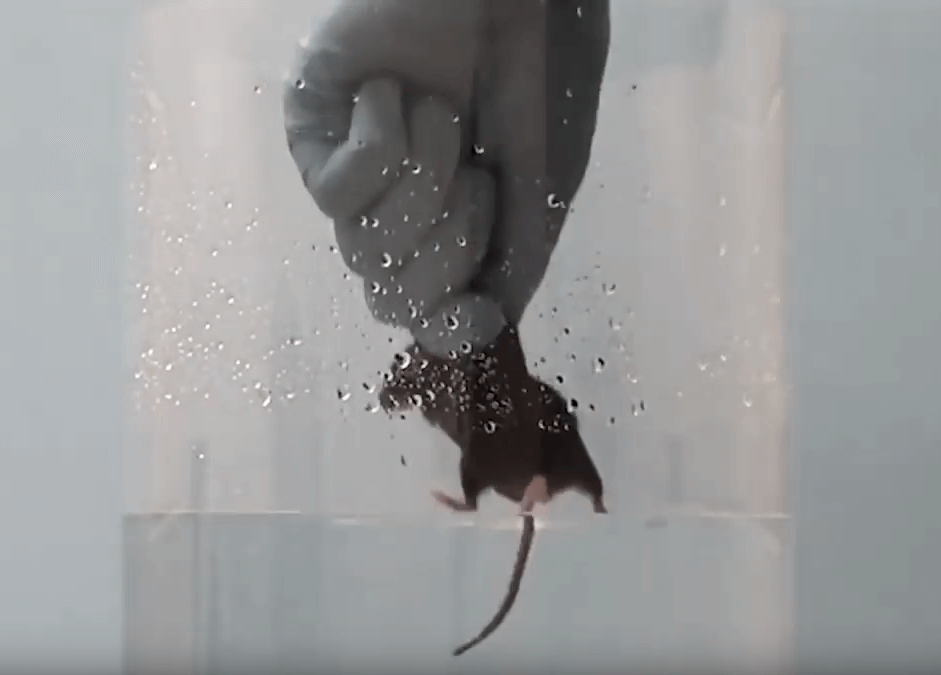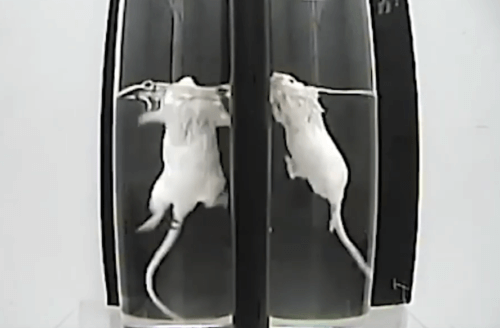After PETA Push, UK Officials Discourage Forced Swim Test
It’s huge progress for both animals and science: following urging from PETA, the use of the forced swim test to model human depression is one step closer to ending in the UK!
Influential scientists working for the Medicines and Healthcare products Regulatory Agency (MHRA) have concluded in a scientific paper that this and equivalent animal tests cannot predict the efficacy of potential new antidepressant drugs. The authors cite PETA’s work with pharmaceutical companies to end the test, in which small animals are dropped into beakers of waters and forced to swim for their lives.
After reviewing the evidence and seeking input from experts, the authors independently reached the same conclusions as PETA scientists: the forced swim test is not a model of depression and could even rule out effective new drugs for humans. The Home Office commissioned the paper, so it’s safe to say that the absurdity of the test has finally been recognised, and scientists must now develop more effective and ethical human-relevant alternatives.
More Than Half a Century of Terror
Since its inception in the 1950s and its unfortunate rise to popularity in the late 1970s, the forced swim test has been used by experimenters in crude attempts to study human depression and find new antidepressant drugs for humans. In the test, experimenters put mice, rats, guinea pigs, hamsters, or gerbils in inescapable containers filled with water. The panicked animals try to escape by attempting to climb up the sides of the beakers or even diving underwater in search of an exit. They paddle furiously, desperately trying to keep their heads above water. Eventually, they’ll start to float.
According to published reports, the test has been widely used, and up to 700 papers describing forced swim test experiments were published over the course of a year. In each experiment, tens to hundreds of small animal might be used.
Junk Science
Experimenters have claimed that the test can be used to measure despair and screen potential antidepressant drugs for humans, but experts disagree.
The forced swim test doesn’t accurately predict whether a drug will work as a human antidepressant. It yields positive results for compounds that aren’t prescribed as human antidepressants, such as caffeine, and negative results for some compounds that are. Importantly, antidepressant compounds that could work in humans may be abandoned mistakenly based on the test, a point made by the authors of the new paper:
“[I]if excessive reliance is placed on the [forced swim test] as a gatekeeper for clinical development, then the existence of potentially effective [antidepressants] that are inactive in the test will remain unknown. In the absence of compelling data on the neurobiological basis of the [forced swim test] and its translatability to man, this remains a possibility.”
In line with this reality, after hearing from scientists with PETA and our international affiliates, most major drug manufacturers, including Johnson & Johnson, Bayer, GlaxoSmithKline, AbbVie Inc, Roche, AstraZeneca, Novo Nordisk A/S, Boehringer Ingelheim, Pfizer, and Bristol Myers Squibb, have left in the forced swim test behind.
PETA has previously written to the Animals in Science Regulation Unit of the Home Office, which initiated this review, regarding the validity of the forced swim test and the dubious grounds on which experimenters are authorised to use it.
The forced swim test has already been banned by two major research universities, including King’s College London, where an author of the paper is employed.
The authors reiterate the widely accepted fact that the forced swim test “is no longer regarded as an animal model of depression”.
It’s clear that the cruel test will soon be a thing of the past for screening potential new antidepressants, but experimenters continue to justify its use, citing other superfluous purposes. Will you help us put the final nail in the coffin of this junk science?
Take Action for Animals Today
Despite a vast industry move away from the forced swim test, a handful of companies and institutions are still using it. Let the universities of Bristol and Bath and pharmaceutical giants Eli Lilly and Sanofi know that it’s time to join the right side of history and ban the cruel test:






